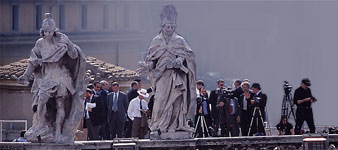One desiring to influence culture must know the language of the media. Such a language has become a common currency that goes beyond media practitioners and affects every single actor in the social and cultural scene. Media, with its inexorable technological development, shapes attitudes and beliefs and helps to make the ideas broadcast by social actors more consistent, in an environment heavily influenced by instant communication and speed.
Genuine comprehension of the language implies a profound change in attitudes and perceptions by all those participating in social dialogue. Principals include the immediacy of news, the inescapability of transparency, and the importance of headlines.
Iconic symbols are another important aspect of media language. Iconic expressions find their way into popular culture, allowing firms and institutions to advance their values and influence the "framing" of persons and organizations alike. In advertising, for example, such symbols give origin to such powerful icons as the brands.
The remarkable days that followed the death of John Paul II provide an historic example of how news has the capacity to produce a "cycle" with a life of its own. If the event remains newsworthy for a protracted period, it ascends into the realm of historic events, provoking reactions and even instant actions from audiences globally.



